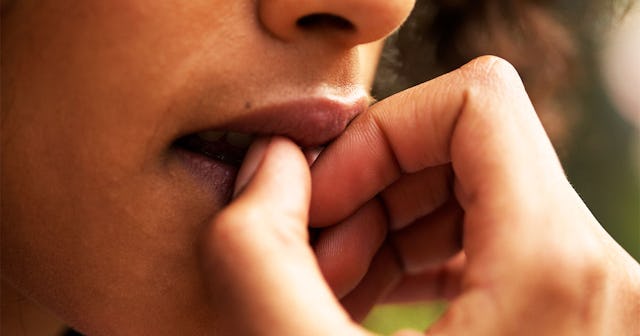Skin Picking, Nail Biting, And Other Compulsive Behaviors Have Increased During The Pandemic

My son has this hair-twisting thing he does. He pulls his hair, twists it, and rubs it with his fingers. You can literally hear his hair going back and forth between his finger and his fingernails when he does it. I’ve watched him do this since he was about one. Before he had hair, he’d do it to my hair when I was holding or was carrying him around in a carrier.
He gets it from me. I’ve done this my whole life, especially when I am stressed or anxious. My parents would always tell me to stop. My grandmother told me I’d never get a boyfriend if I didn’t quit playing with my hair.
I’ve caught myself several times doing it during sex when I’m not present, or while having lunch with friends if I have a lot on my mind. There have been times when I’m watching television and my arm falls asleep because it’s been pulling at my hair.
It’s a habit I’ll probably never break. It brings me comfort, and at this point I’m not even aware I’m doing it half the time.
Since last March, when everything was shut down and things were so uncertain due to COVID-19, my son’s been twisting a lock every time he comes down stairs in the morning. He’s twirling when he eats. He does it when he’s doing his homework. I even watched him do it while he was driving me to an appointment.
I know my hair playing has increased too. It’s my go-to to let off some steam.
I also noticed my boyfriend has been biting his nails all the time, something he never did when we started dating a few years ago. He owns his own business, and this pandemic has tested him with a lot of twists and turns as it has so many other people.
According to a recent survey, body-focused repetitive behaviors (BFRBs) have increased in 67.2 of those who suffer since COVID-19. Journal Of The American Academy of Dermatology reports, “Although this study was limited by modification of standardized scales and its self-reported survey design, it suggests that anticipated psychological effects of the pandemic are, in fact, materializing. Respondents with both skin and hair BFRBs reported increased distress and functional impairment.”
About 1 in 20 people suffer from BFRBs. Experts aren’t sure of the exact cause, but say genetics and your personality play a large role.
According to WebMD, tension and worry can trigger these habits to start in people as well as increase them in those who are already suffering.
It makes sense that something like the pandemic can make these behaviors worse, since we’ve all been experiencing so many changes this past year. This has been extremely stressful on everyone and made us feel like we don’t have as much control over ourselves, not to mention the worrying.
I pull on my hair quite a bit on a good day, so when my mind is tied up with something as big as COVID-19, social distancing, and all the changes in our daily schedules, my ritual of playing with my hair is something I can control — so I do it a lot more. Many people who are anxious need something to do with their hands to calm their nerves, because it does help.
We all have little quirks we do every once in a while. However, it’s very different when you don’t feel like you have control over picking your skin, pulling out your hair or lashes, or biting your nails. This pandemic may have induced a lot of BFRBs, or made existing behaviors worse.
If that’s the case, you may be feeling out of control and like you want to get it figured out.
Healthline explains when you are doing something like biting your nails until they are raw and red, or picking skin so much you have damage, it’s a good idea to seek treatment.
There are options out there to help you stop these behaviors such as Cognitive Behavioral Therapy, medications such as Prozac or Zoloft, as well as natural treatments like acupuncture, massage, or finding alternative behaviors such as chewing gum.
Harvard Health recommends knowing your triggers, saying, “Understanding your triggers can be a first step in deciding which treatments to pursue. For example, if your picking is triggered by a skin condition such as acne or itch, you might be best served by first seeing a dermatologist.”
According to Harvard Health, you can also get some relief by finding something to distract your hands such as a fidget or a stress ball.
Another method is to reach out for help by telling those you know you are trying to stop. This way, you are held accountable and will be more motivated to stop since others have been recruited to notice when you are doing it.
If you are struggling with any of these conditions, it’s important to find something that works for you. There isn’t a one size fits all cure; it’s about doing something (or finding something) that will motivate you to stop so you can relieve some of the anxiety in a way that leaves your body — and your confidence — intact.
This article was originally published on